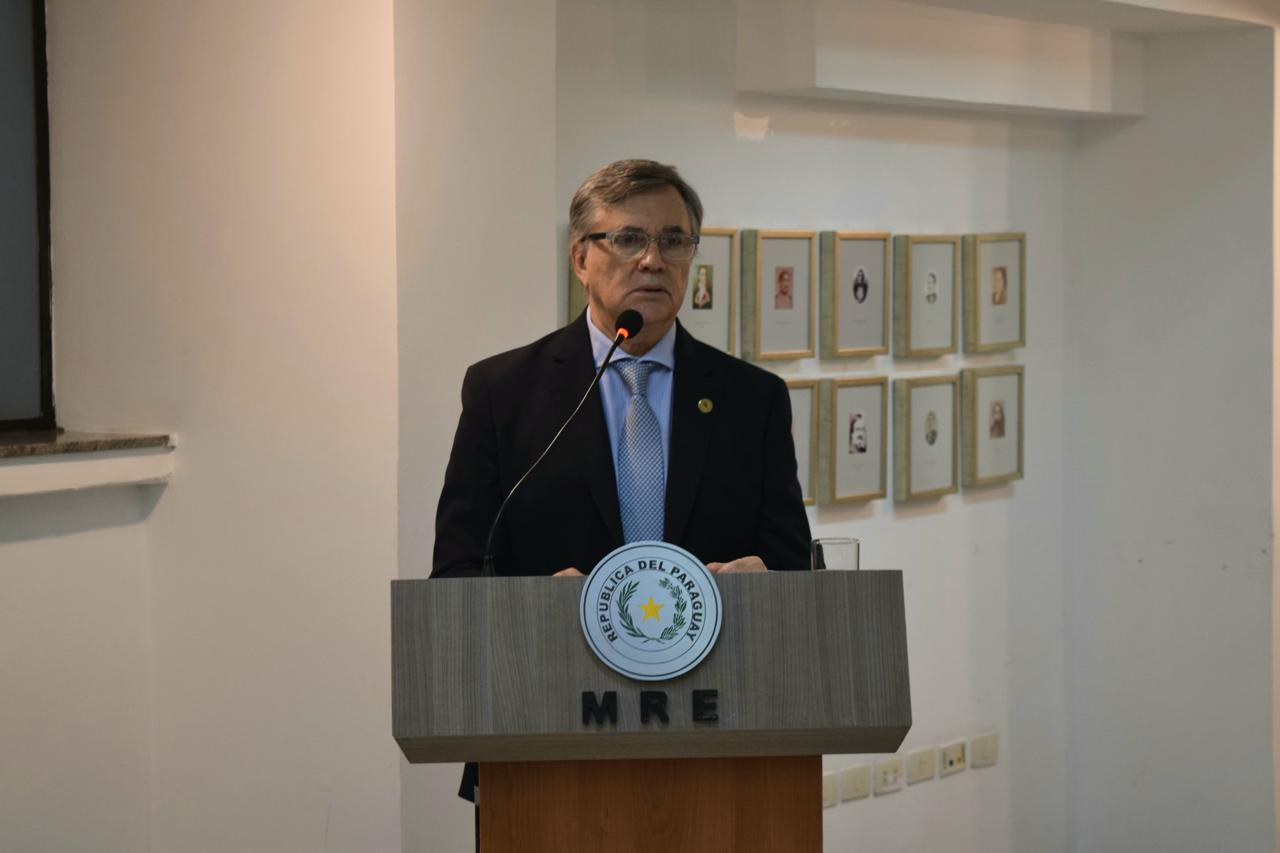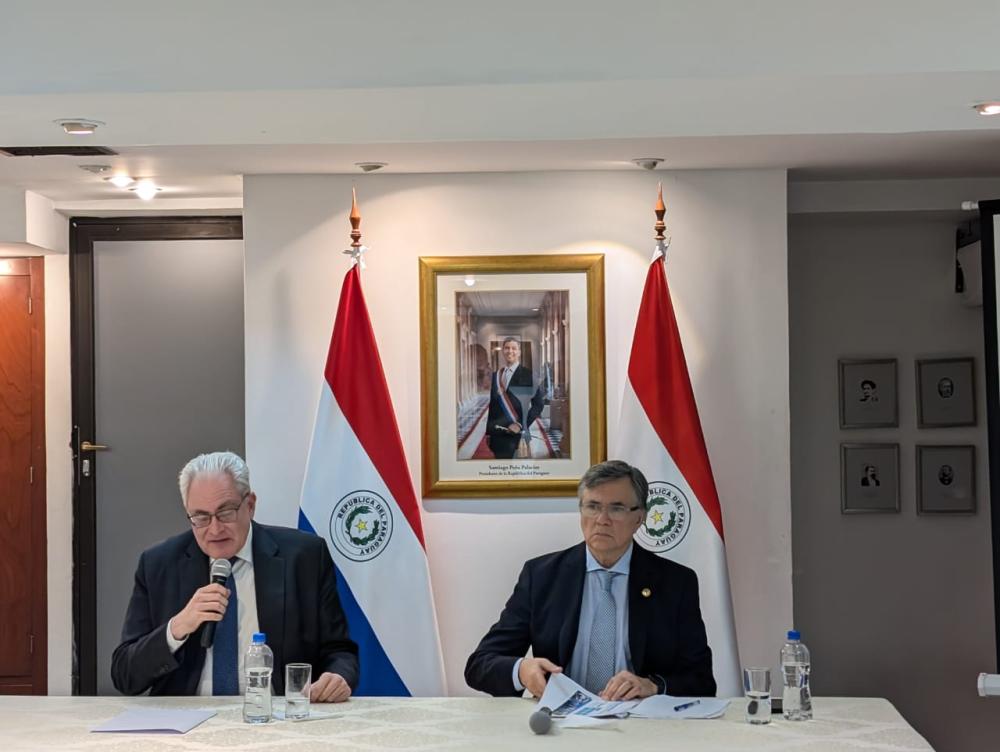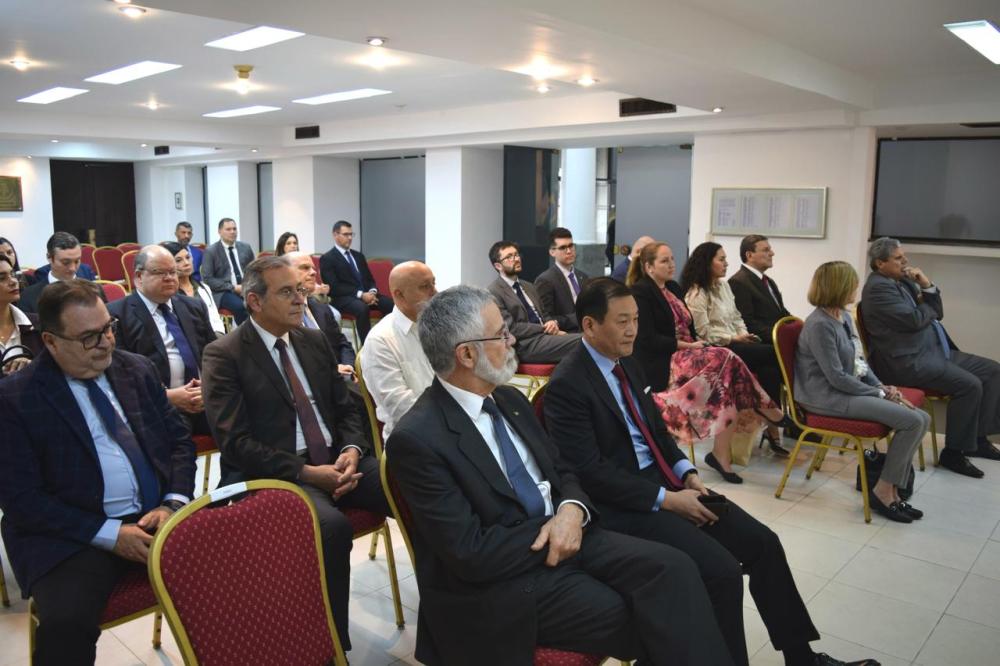Manuel Otero was invited to give a lecture on the challenges facing global food security by the Ministry of Foreign Affairs and the Carlos Antonio López Diplomatic and Consular Academy, which trains the members of Paraguay’s foreign service.

Asunción, 11 September 2024 (IICA). The new frontier of science and technology is the key for transforming agri-food systems so they are equipped to respond to the ever-greater demands being placed on them by multiple global crises, the Director General of the Inter-American Institute for Cooperation on Agriculture (IICA) told a distinguished audience in Asunción, Paraguay.
Manuel Otero was invited to give a lecture on the challenges facing global food security by the Ministry of Foreign Affairs and the Carlos Antonio López Diplomatic and Consular Academy, which trains the members of Paraguay’s foreign service. A large proportion of the diplomatic corps accredited in Paraguay attended the lecture, which took place in the auditorium of the Ministry of Foreign Affairs.
The Director General of the Diplomatic and Consular Academy of Paraguay’s Ministry of Foreign Affairs, Ricardo Scavone, introduced Otero, who emphasized in his lecture that agriculture is now at the top of the global agenda. This is due to the fact that there are 282 million people in a state of acute food insecurity in 59 countries, a situation aggravated by the effects of climate change on agriculture and numerous political and economic shocks affecting trade, production and transportation.
Otero also highlighted the importance of the agriculture sector in Latin America and the Caribbean and across the continent as a whole, reflected in its share of global food production and food exports, and emphasized the contribution it also makes to the countries’ positioning on the global stage.
Before the lecture, Scavone said that “IICA is a key player in our countries with regard to agriculture, which is vital for Paraguay, for its economic development, its exports, for the social situation, and for our contribution to global food security.”
Otero stressed that, looking at the current context, it is not the first time that agriculture has faced huge challenges, citing situations such as the economic depression of the 1930s, the Second World War, the food price crisis in 2007-2008 and the recent COVID-19 pandemic.
He argued that digital agriculture, gene editing in plants and animals, the development of biotechnology, the recovery of soil health, the biofortification of crops, synthetic biology and the production of biofuels are some of the ways in which, thanks to science and technology, agriculture can provide solutions.
“The future is not random. And we need to know that challenges are also opportunities. But this calls for a new generation of public policies that recognize the multidimensional nature of the objectives and the need for collective action,” the Director General of IICA said.
The priority objectives, he added, should include adapting to climate change and contributing to its mitigation; restoring soils, ecosystems and natural resources; taking advantage of primary and waste biomass to help make production more efficient and sustainable; and using biodiversity for the production of nutraceutical foods, drugs, and green chemistry.

Hemispheric Partnership
Otero gave details of the Hemispheric Partnership for Food Security and Sustainable Development, which IICA is promoting with the support of the region’s ministers of agriculture. The objective is to help mobilize existing technical expertise in the region to generate solutions to common problems that limit the effectiveness of the agri-food systems of the Americas.
IICA intends to position and give the continent a voice in the international technical and political debate on the planet’s future. The next step in this direction will be taken in November, when, for the third consecutive year, the Institute will have its own pavilion at the United Nations Climate Change Conference (COP 29), which on this occasion is to be held in Azerbaijan. The space, called the Home of Sustainable Agriculture of the Americas, will serve as a forum for countries and producers from the continent to showcase to the world the progress they have made in sustainable production.
“The narrative matters,” Otero explained, underlining the need to raise awareness of the fact that agriculture is better than in the past, in terms of both productivity and sustainability, and its contribution to national economic and social development. And that in the future it will be even better.
To prove his point, he gave figures showing that agriculture has been a real driver of development in the Americas. It accounts for nearly five percent of the continent’s Gross Domestic Product (GDP) and almost twelve percent of employment, and last year agri-food exports were worth more than USD 350 billion dollars.

Latin America and the Caribbean is key to the efforts to transform global agri-food systems because the region is a guarantor of the world’s food, nutrition and climate security. We have fifty percent of the world’s known biodiversity, thirty-five percent of it freshwater reserves, and twenty-eight percent of the surface area is potentially usable for agricultural expansion,” the Director General added.
Otero believes that only through collective action will it be possible to successfully address simultaneous challenges, which include the climate crisis, food and nutrition insecurity, the need to speed up the energy transition, and the urgency of increasing access to the advances in science and technology.
“The context and the outlook mean we must work together to achieve sustainable, resilient and inclusive agri-food systems. The future depends on us,” he concluded.
Following the lecture, Otero answered a number of questions, including from the heads of mission in Paraguay from Brazil, José Antonio Marcondes de Carvalho; from Ecuador, Pablo Ruiz Echeverría; and from Taiwan, José Chih Cheng Han. The questions were related to issues such as family farming in the Americas, climate action in agriculture, the use of artificial intelligence in the sector, and gene editing.
More information:
Institutional Communication Division.
comunicacion.institucional@iica.int











